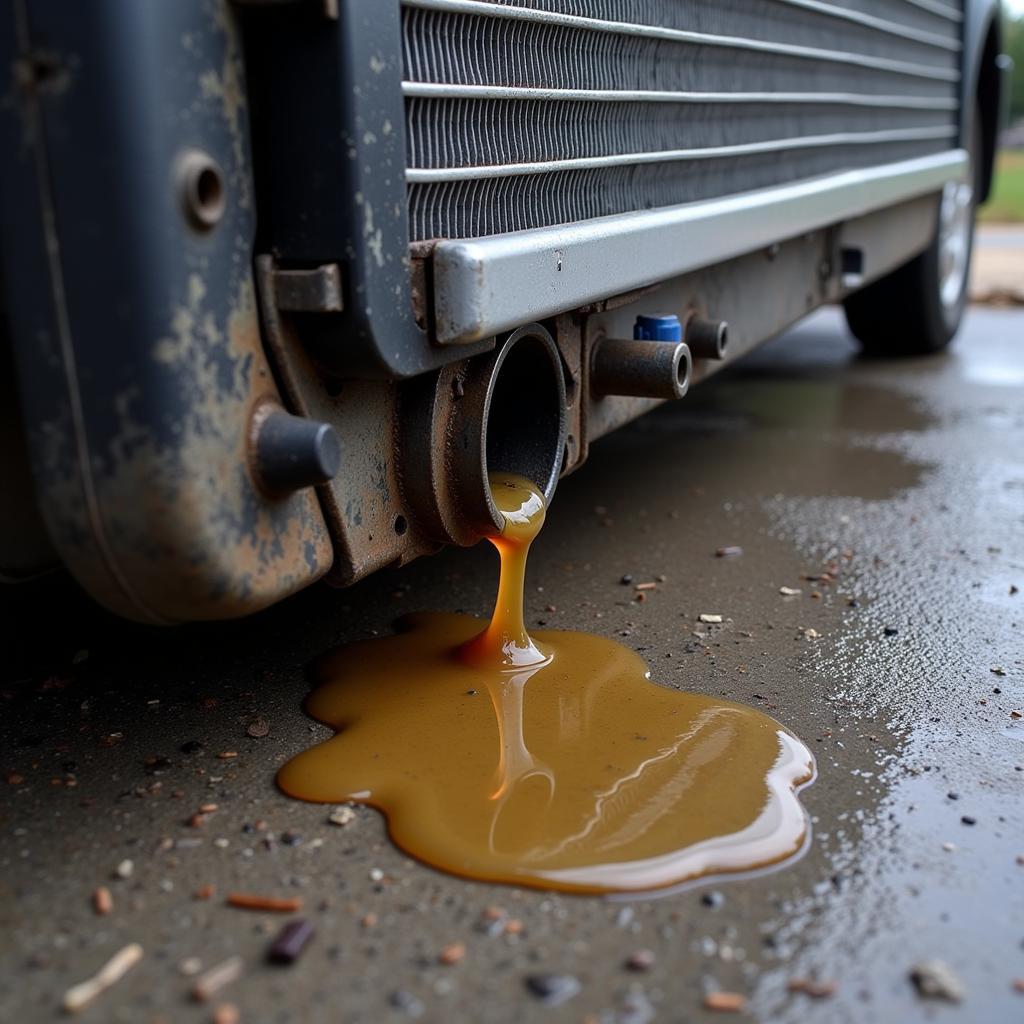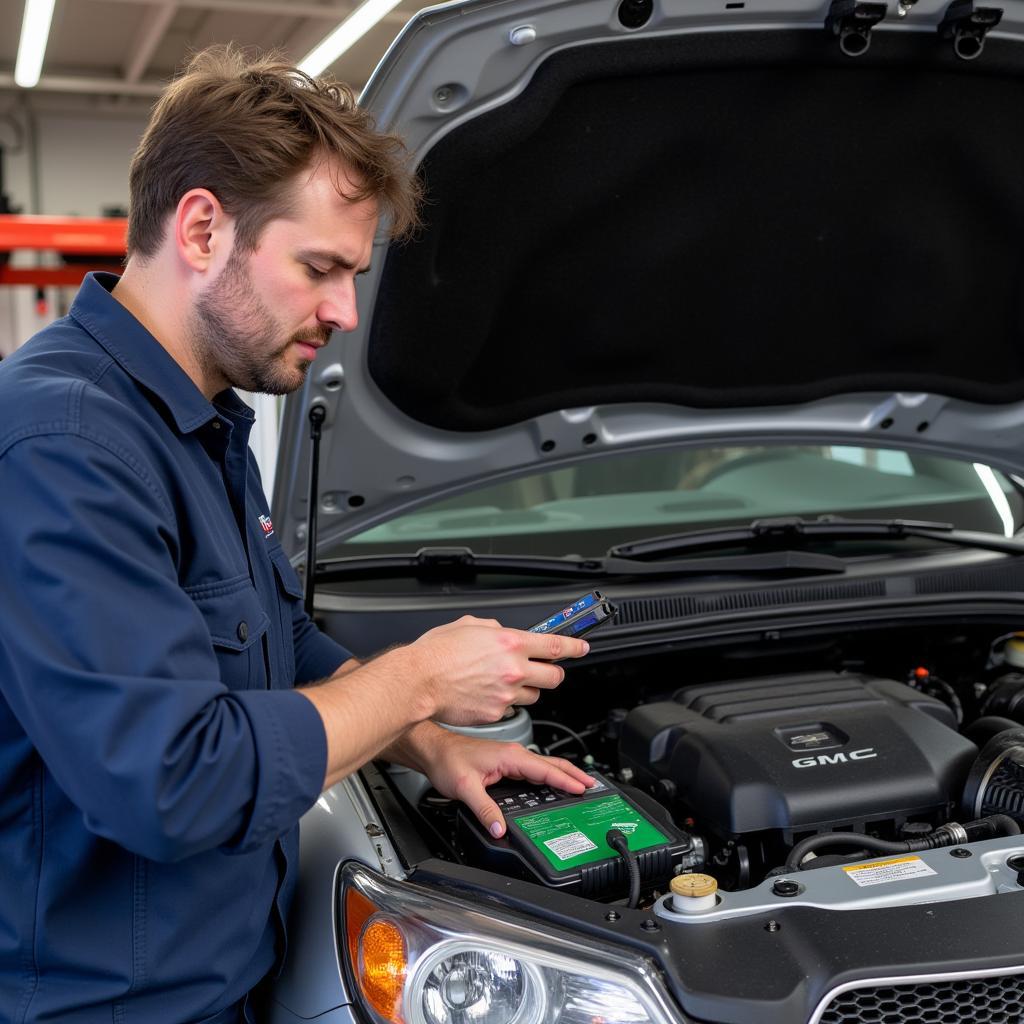A leaking car radiator can quickly lead to overheating and engine damage. Knowing how to Fix A Car Radiator Leak, or at least diagnose the problem, is crucial for any car owner. This guide provides a comprehensive overview of common causes, diagnostic techniques, and repair options for fixing a car radiator leak.
 Car Radiator Leak Overview
Car Radiator Leak Overview
Identifying the Source of the Leak
Before you can fix a car radiator leak, you need to pinpoint its origin. Leaks can originate from various components of the cooling system, including the radiator itself, hoses, clamps, and the radiator cap. A careful inspection is necessary. Start by visually examining the radiator for any cracks, holes, or corrosion. Look closely at the seams and connections. Check the hoses for signs of wear and tear, such as bulges, cracks, or softness. Inspect the clamps for tightness and corrosion.
how do you fix a car radiator leak
Pressure Testing the Cooling System
If a visual inspection doesn’t reveal the leak, a pressure test can be invaluable. This involves using a specialized tool to pressurize the cooling system and identify leaks. The pressure test can pinpoint even small leaks that might be missed during a visual inspection.
Common Radiator Leak Repair Solutions
Once you’ve located the leak, several repair options are available, depending on the severity and location of the damage.
Radiator Stop Leak Products
For small leaks, radiator stop leak products can be a temporary fix. These products contain chemicals that seal small holes and cracks. However, it’s important to remember that these are generally temporary solutions and a proper repair is often necessary. how to fix a pinhole leak in a car radiator explores this topic in greater detail.
Replacing Damaged Hoses and Clamps
If the leak is coming from a hose or clamp, replacing the damaged component is a straightforward and relatively inexpensive fix. Ensure you use the correct type and size of hose and clamp for your vehicle.
Repairing or Replacing the Radiator
For more significant damage to the radiator itself, repair might be possible depending on the extent of the damage. Sometimes, patching or soldering can be effective. However, in many cases, replacing the entire radiator is the most reliable solution, especially if the radiator is old or severely corroded. Knowing how much to fix car radiator leak is essential for budgeting your repair.
When to Seek Professional Help
While some radiator leak repairs can be handled by DIY enthusiasts, more complex issues often require the expertise of a qualified mechanic. If you’re unsure about the diagnosis or repair process, it’s always best to consult a professional. can a leaking car radiator be fixed discusses the scenarios where professional help is necessary.
Quote from John Miller, ASE Certified Master Technician: “Regularly inspecting your cooling system and addressing small leaks promptly can prevent more serious and costly repairs down the road.”
Why is my car radiator leaking?
Several factors can cause a car radiator leak. These include physical damage from debris, corrosion due to age and environmental factors, and faulty hoses and clamps.
Quote from Susan Davis, Automotive Engineer: “A pressure test is the most effective way to pinpoint even the smallest leaks in your cooling system.”
Conclusion
Fixing a car radiator leak is crucial to maintaining your vehicle’s health and preventing costly engine damage. By understanding the causes of leaks, conducting thorough inspections, and choosing the appropriate repair method, you can keep your cooling system in optimal condition. If you need assistance, feel free to reach out to us at AutoTipPro at +1 (641) 206-8880 or visit our office at 500 N St Mary’s St, San Antonio, TX 78205, United States.
Quote from Michael Rodriguez, Automotive Instructor: “Don’t underestimate the importance of a properly functioning cooling system. A small leak can quickly escalate into a major problem.”
FAQ
- What are the signs of a radiator leak? Low coolant levels, overheating, puddles of coolant under your car, and a sweet smell are common indicators.
- Can I drive with a leaking radiator? No, driving with a leaking radiator can cause severe engine damage due to overheating.
- How much does it cost to fix a radiator leak? The cost varies depending on the severity and location of the leak, ranging from a few dollars for a hose clamp to several hundred for a new radiator.
- How can I prevent radiator leaks? Regular maintenance, including coolant flushes and inspections, can help prevent leaks.
- What is the difference between a radiator leak and a head gasket leak? While both can lead to coolant loss, a head gasket leak often presents with white smoke from the exhaust and oil mixed with coolant.
- Can I use tap water instead of coolant? No, tap water can cause corrosion and damage to your cooling system. Always use the recommended coolant type for your vehicle.
- How often should I check my coolant level? It’s a good practice to check your coolant level at least once a month.





Leave a Reply